Elements: Extraterrestrial Organic Matter
February 15, 2024
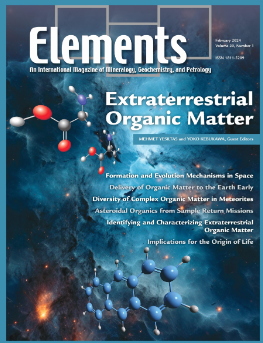
Extraterrestrial organic matter is found in various extraterrestrial environments and in various forms. It forms in a variety of locations through different mechanisms in space. As such, its nature, distribution, formation mechanisms and locations are of particular interest. Some organic molecules are even considered as key players for the emergence of life on Earth and possibly beyond. Therefore, their detection and characterization can contribute to the understanding of the early solar system evolution as well as the origin of life. Despite decades of work and research, there are still many questions and unknowns on this topic. The aim of this issue of Elements is to offer an overview of the concept of extraterrestrial organic matter as well as the latest scientific findings.
Current Geochemical Society members can access this issue now via the Elements website using your email address (UserID) and member number (Password).
Elements: Geometallurgy
January 09, 2024
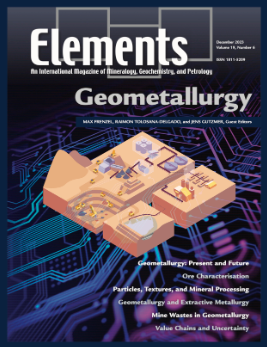
Geometallurgy is an interdisciplinary research field concerned with the planning, monitoring, and optimization of mineral resource extraction and processing. Geometallurgy requires a quantitative understanding of primary resource characteristics such as mineralogical composition and texture, the distribution and variability of these characteristics across the target ore body, and how these interact with mining and beneficiation processes. This requires accurate analytical data for resource characterization, a detailed understanding of ore body geology, process technology, economics, and the often-complex interactions between them. In this issue of Elements, we explore the fundamental concepts relevant to the field. We also review how current geometallurgical research is opening up opportunities for geoscientists to generate better economic and environmental outcomes for the global raw materials industry as part of a sustainable economy.
Current Geochemical Society members can access this issue now via the Elements website using your email address (UserID) and member number (Password).
GS and EAG Announce Goldschmidt2026 in Montreal
September 06, 2023

The Geochemical Society and the European Association of Geochemistry will hold the 2026 Goldschmidt Conference from July 12-17, 2026 in Montréal, Québec, Canada. The meeting venue will be the Palais des Congrès de Montréal in the center of the city. View all upcoming conferences
Image © Stéphan Poulin - Tourisme Montréal
GS Adopts Bylaws Amendments
August 14, 2023
In July, the GS board of directors approved a number of amendments to the society's bylaws, which govern the rights and responsibilities of the members and officers of the organization. Last amended in 2017, some sections of bylaws had become outdated. The amendments include provisions that:
- Update the responsibilities of officers, such as the president, vice president, and secretary to accurately reflect the duties of those positions;
- Add the option for meetings of the board and the membership to be held virtually (online);
- Add references to early career directors, who are elected to the board for two-year terms;
- Remove specific tasks of various society committees (these were moved to a policy manual that can be more easily updated to reflect the current needs and responsibilities of the committees);
- Update legal language in indemnification provisions and relating to Texas laws governing nonprofit corporations (the GS is incorporated in Texas).
Bernd (Berni) R.T. Simoneit (1937-2023)
August 03, 2023
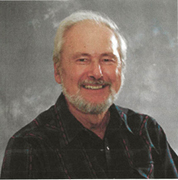
It is with deep sadness that we report that Bernd R.T. Simoneit, an impressively productive and prolific organic and environmental biogeochemist and a Professor Emeritus of Oregon State University, died at his home in Corvallis on July 23, 2023.
Berni was born in Germany and immigrated to America as a young boy with his parents and his sister to settle in Rhode Island. He started his college education in New England, receiving his undergraduate degree in chemistry from Boston University (1965). He then took on a research position at the Space Sciences Laboratory of the University of California at Berkeley (1966-1973). A chance encounter with Geoff Eglinton, who was visiting the Laboratory, led to his earning his PhD in organic geochemistry from the University of Bristol (UK) in 1975. He subsequently held positions at the Institute of Geophysics and Planetary Physics at the University of California, Los Angeles (1976-1981), and the College of Oceanic and Atmospheric Sciences of Oregon State University (1981-2002). In addition to these permanent positions, he had visiting scientist positions at the California Institute of Technology (1965-2002), Tokyo Metropolitan University (1992), the Centre d'Investigacio I Desenvolupament, C.S.I.C., Barcelona, (1996-1997), Hokkaido University, Japan (2002), Florida International University (2003-2004), and the King Saud University, Riyadh (2008-2015). The overarching theme uniting Berni's studies at these multiple institutions was his intense curiosity about the nature of the chemical signatures that different lifeforms have left on our planet, a curiosity that led him to discover an impressively broad suite of molecular and isotopic biomarkers.
Asmeret Asefaw Berhe Receives 2023 John Hayes Award
July 13, 2023
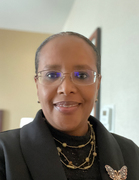
Asmeret Asefaw Berhe, who is on leave from the University of California, Merced to serve as Director of the DOE Office of Science, received the 2023 John Hayes Award from the GS. The award is given to a mid-career scientist for outstanding accomplishments that draw together multiple fields of investigation to advance biogeochemical science. It was created in 2017 by the Organic Geochemistry Division and a group of friends, colleagues, and students of John Hayes. Prof. Berhe is recognized for contributions to our understanding of the dynamics of carbon transport and stabilization in soils, from molecular to watershed scales. Her research has transformed our conceptual model of terrestrial carbon cycling by incorporating a landscape perspective, specifically, geomorphology and hillslope processes, into biogeochemical studies.
Ken Rubin to Receive Distinguished Service Award
June 23, 2023
Ken Rubin of the University of Hawaiʻi at Mānoa will receive the 2023 GS Distinguished Service Award at the Goldschmidt Conference in July. He is recognized for extraordinary service to the Geochemical Society and the broader geochemical community through his leadership as chair of the Local Organizing committee and Science Committee member for the Goldschmidt Conferences in 2020 and 2022. The Distinguished Service Award is presented on an irregular basis to recognize contributions that greatly exceed the normal expectations of voluntary service.
Executive Editor of GCA
June 06, 2023
The Geochemical Society and the Meteoritical Society are seeking qualified candidates to serve as Executive Editor (EE) of Geochimica et Cosmochimica Acta (GCA). The appointment is for an initial 3-year term commencing January 1, 2025, with the possibility of an additional 3-year term by negotiation with the societies and the publisher. GCA publishes research papers that address fundamental aspects of geochemistry and cosmochemistry as well as articles relating to key activities of the sponsoring societies.
Consideration of applicants will begin October 1 and continue until the position is filled. Learn more
James Bischoff (1940-2021)
March 23, 2023
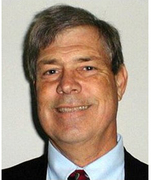
It is with great sadness that we announce the passing of Jim Bischoff who died at the age of 80 on February 17, 2021. Jim had battled several serious illnesses over the past couple of decades and finally succumbed while in the care of hospice with his family at his side. He is survived by his wife Marybeth, children Matthew and Lorena, and four grandchildren.
His curiosity driven life in the pursuit of science led him to a highly successful career in marine geochemistry. Recognizing the impracticality of a fantasy career in archaeology Jim obtained an undergraduate degree in geology at Occidental College and PhD in geochemistry at Berkeley in 1966 under Bill Fyfe. He carried out a two-year postdoc at Woods Hole during a time of great excitement about new discoveries in the oceans, especially about this outrageous new idea of seafloor spreading. After five years as Professor at University of Southern California, Jim joined the Branch of Pacific and Coastal Marine Geology of the USGS in 1974. He quickly built the marine geochemistry program to international acclaim.
GS Statement on Ukraine Crisis
March 10, 2022
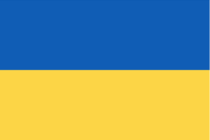
The Geochemical Society condemns the war, violence, and the loss of civilian life in Ukraine. We stand by the country's citizens and our Ukranian colleagues and their families who are affected. Our greatest desire is for peace and an end to the suffering and displacement caused by this crisis.
While issues of survival are taking precedence for many people, the work of science also continues, so we offer these resources as a small contribution to cooperation and goodwill. To the extent it is possible for scientists in Ukraine to participate in a conference, the EAG and GS will offer free participation for them at the upcoming 2022 Goldschmidt Conference.
A growing list of research institutions in Europe and elsewhere are offering to host refugee scientists through a community initiative. Learn more